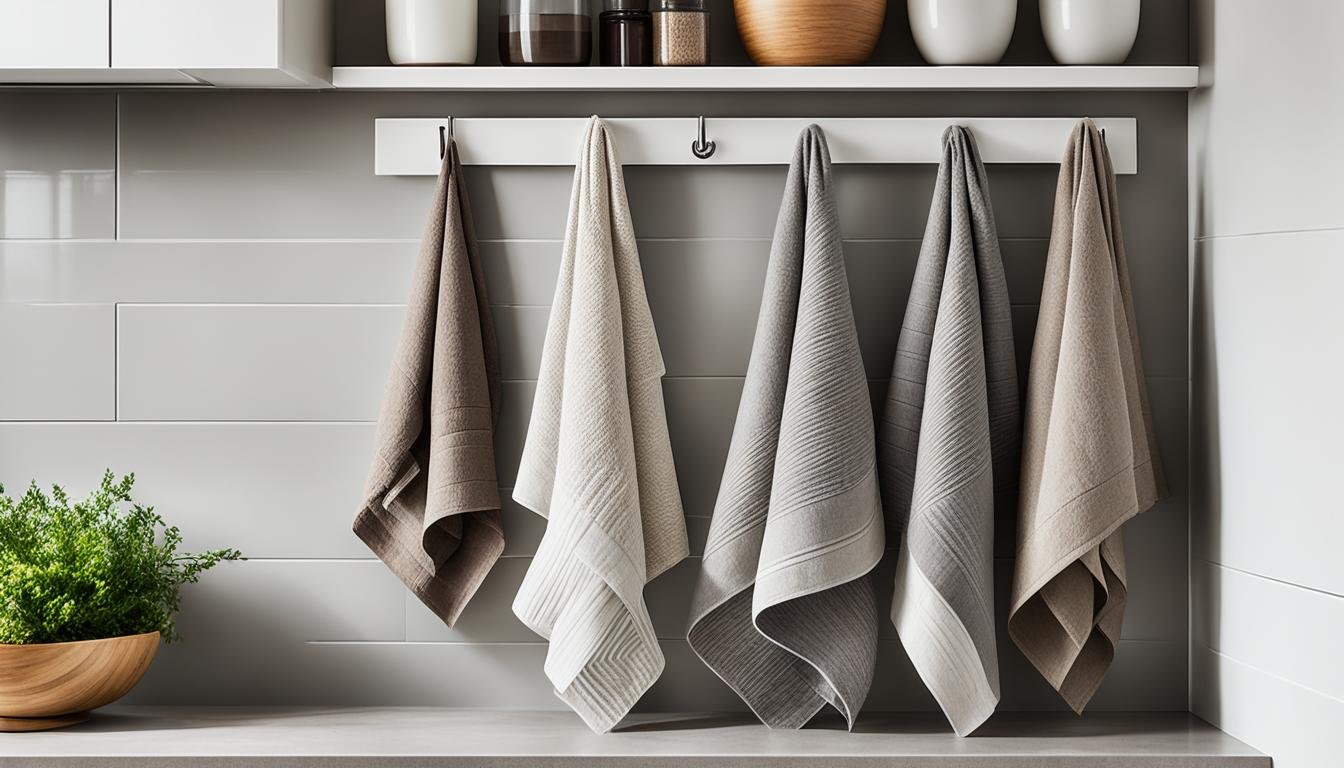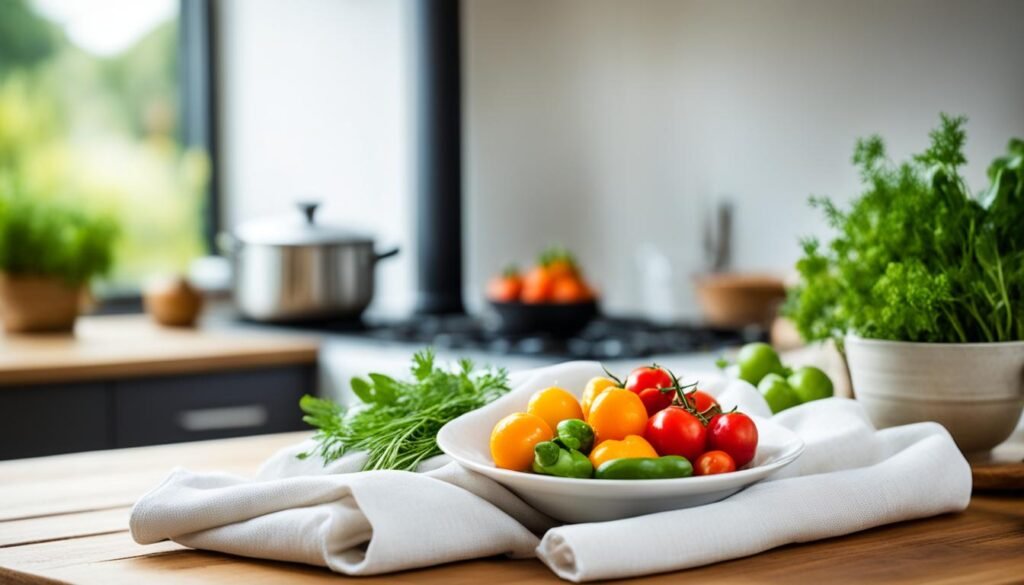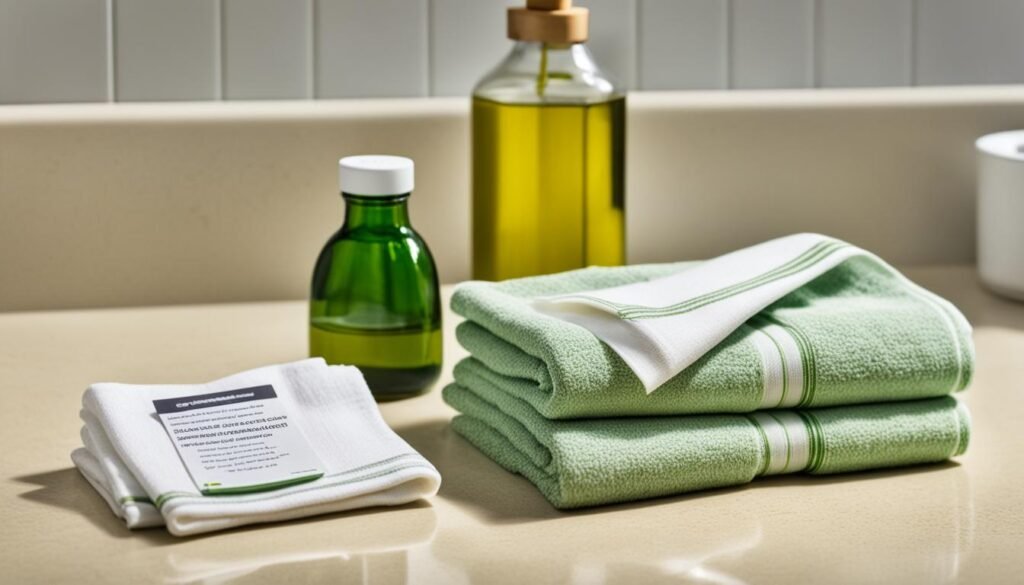Your cart is currently empty!

Linen Advantages: Top Kitchen Benefits to Know
In the realm of interior design, linen has earned its place as a highly esteemed fabric. With roots dating back to ancient civilizations, its timeless appeal remains evident in the modern kitchen design. Whether it’s table linens or kitchen towels, the use of durable linen brings about an infusion of character and functionality that is unparalleled. As eco-friendly kitchen textiles, the utilization of linen not only contributes to a more sustainable environment but also enhances the beauty and efficiency of your culinary space.
Furthermore, the natural fabric benefits of linen extend beyond the realms of aesthetics and durability. The material’s ability to regulate temperature ensures comfort throughout the year, while its antimicrobial property promotes a healthier kitchen ambiance. Not to mention, the softness and strength of this magnificent fabric add an element of luxury to your daily cooking experience, perfecting your culinary aesthetics.
Key Takeaways
- Linen’s unique texture adds depth and character to kitchen décor.
- The fabric is known for its strength and longevity, despite its softness.
- Linen imparts a timeless elegance to both casual and sophisticated styles.
- Its temperature-regulating properties provide comfort all year round.
- The breathability of linen promotes air circulation, ensuring a fresh kitchen environment.
- Linen is antimicrobial, hypoallergenic, and eco-friendly, making it a superior choice for kitchen textiles.
The Aesthetic Appeal and Durability of Linen in Kitchen Design
The character and life that linen brings to kitchen interiors is remarkable. The linen aesthetic texture with its distinct natural charm beautifully supplements a variety of design styles, proving linen’s versatility in kitchen interior design. From its unique tactile quality that contributes to a warm, inviting ambiance, to its strength and durability that withstand the demands of daily kitchen use, linen’s attributes make it a prime choice for kitchen textiles.
Natural Texture That Enhances Kitchen Decor
The linen aesthetic texture greatly enriches any kitchen decor, be it contemporary or traditional. The slightly coarse yet amiably tactile quality of linen adds an element of authenticity to the kitchen’s atmosphere. This natural texture not only lifts the decor visually but also creates a warm, welcoming environment, setting the stage for delightful culinary experiences.
Timeless Elegance for Table Settings
From daily dining to special occasions, the elegance of linen finds perfect harmony in table settings. The natural creases that linen carries effortlessly contribute a soft, relaxed elegance, inviting guests to savor their meals and linger over conversation. Whether it’s for a casual brunch or a formal dinner, linen table linens strike the ideal balance between sophisticated aesthetic and practical functionality.
Strength and Longevity of Linen Fabrics
Beyond its aesthetic appeal, linen is known for its incredible durability. This long-lasting fabric withstands kitchen wear and tear remarkably, ensuring it continues to grace your interiors beautifully while meeting the demands of daily use. Strong natural fibers give linen its remarkable lifespan, outperforming other commonly used kitchen textiles like cotton. A distinct characteristic of linen is its ability to maintain its shape while becoming even softer with each wash, enhancing the user’s experience over time.
This versatility in aesthetic appeal and durability solidify linen’s place in durable kitchen textiles, making it a formidable choice for stylish yet functional kitchenware.
Benefits of Using Linen in the Kitchen
The functional advantages of linen in the kitchen are numerous and remarkable. Kitchen environments with their spills and dampness require materials that can tackle such conditions effectively, and linen’s inherent properties make it a superior choice.

Moisture Absorption and Quick Drying Properties
Linen’s natural fibers boast a high moisture absorption rate, a crucial aspect in a setting where liquid spills are a common occurrence. Not only is linen adept at absorbing liquids, but it also dries exceptionally quickly, curbing the buildup of bacteria and unwanted odors. This feature of moisture-wicking linen is especially beneficial for kitchen hand and dish towels.
Antimicrobial Qualities for a Healthier Kitchen
Moreover, linen’s antimicrobial properties contribute substantially to maintaining a healthier kitchen. By inhibiting bacterial growth and reducing the risk of mildew, antimicrobial kitchen textiles are a safeguard against common kitchen contaminants. This ensures cleanliness and hygiene, making linen an excellent choice for people seeking a healthy kitchen environment.
Hypoallergenic Material Ideal for Sensitive Individuals
Another noteworthy benefit of linen is that it is inherently hypoallergenic. This boon proves to be a significant advantage for those with sensitivities or allergies. Linen’s ability to deter allergens and limit irritation makes kitchen textiles not only comfortable to the touch but also gentle on the skin. From everyday linen towels to stylish aprons, the hypoallergenic benefits of linen materials can never be overstated.
To sum it up, linen’s blend of absorption, antimicrobial, and hypoallergenic qualities contribute to promoting a healthier, more comfortable kitchen environment. These attributes affirm that selecting linen for kitchen use aligns with both practical and health-conscious decisions.
Practicality and Ease of Maintenance
Contrary to what one might assume, linen’s luxury does not preclude ease of maintenance—it’s surprisingly simple to care for. Linen is resilient and well-suited for the often-messy kitchen environment, exemplifying the appeal of easy-care linen.
Regular machine washing is often recommended for linen, making it one of the more practical kitchen fabrics in use today. When laundering linen kitchen textiles, using cold water and avoiding bleach or optical whiteners can help preserve the integrity of the fibers and enhance their longevity, speaking to the appeal of low-maintenance textiles.
| Caring for Linen Products | Benefits |
|---|---|
| Machine Washing | Easy to clean and well-suited for regular use |
| Using Cold Water | Helps preserve linen’s integrity and longevity |
| Avoiding Bleach or Optical Whiteners | Prevents damage to fibers and preserves color |
Interestingly, linen items can be either tumble dried or air-dried. Moreover, ironing is typically unnecessary as the fabric’s characteristic wrinkles lend a sense of effortless sophistication, making it a time-saving choice in a busy kitchen setting. This wrinkle-friendly nature of linen is not only acceptable but desirable, and is part of its laid-back yet elegant charm.

With a little effort, linen maintains its aesthetic and functional qualities, making it an ideal choice for the discerning homeowner who values both ease of care and durability. The practicality of linen in the kitchen is underlined by its long-lasting nature, as well-cared-for linen items become softer and more pleasant over time. These attributes make linen an excellent candidate for heirloom kitchen pieces, treasured items that are cherished by future generations due to their traditional appeal and enduring quality.
Conclusion
In the world of kitchen textiles, linen has emerged as a superior choice for its unique blend of elegance, practicality, and sustainability. The fabric’s natural charm and lasting durability ensure that it stands the test of time, offering value far beyond initial investment. In this final section, we will further discuss some of the key reasons behind investing in linen for kitchen use and the sustainable impact of embracing linen products.
Investing in Linen for Lasting Kitchen Elegance
The perfect blend of timeless aesthetics and robust resilience makes investing in linen for your kitchen a sound decision. The fabric’s natural elegance effortlessly enhances any kitchen, irrespective of its style. However, what sets linen apart is its durability; with proper care, linen products can be cherished for years. Embracing linen in kitchen decor is not just about enhancing visual appeal, it’s also about enjoying an experience that caters to functional needs without ever sacrificing on style or comfort. To put it succinctly, linen is the perfect embodiment of the old adage – ‘beauty with utility’.
Embracing Sustainable Practices with Linen Products
Conscious consumers realize the importance of sustainable choices and linen fits the bill perfectly. The cultivation and processing of flax, the plant linen is derived from, are less resource-intensive compared to many other textile crops. Furthermore, linen is fully biodegradable, contributing to a cleaner, greener environment. Opting for eco-friendly linen textiles aligns with a lifestyle that prioritizes sustainability, heralding an environmental ethos in the very heart of your home – the kitchen. By integrating linen into your kitchen, you make a lifestyle choice that honors tradition and looks towards a sustainable future, resonating a harmonious accord of form and function.
Inclusion of linen in your kitchen decor quintessentially underscores a smart, sustainable, and style-oriented approach. This unrivaled combination makes linen the perfect choice for those looking to harmonize style, functionality, and a commitment towards the environment. Indeed, the understated elegance of linen is a lasting investment in not just your kitchen, but also in a sustainable future.
FAQ
Why use linen in the kitchen?
Linen offers a host of benefits for kitchen use. It has a natural texture that enhances kitchen decor, is inherently strong and durable, and features temperature-regulating properties for year-round comfort. It also has exceptional absorbing qualities, is hypoallergenic and antimicrobial. Its sustainability credentials make it a favorite among eco-conscious consumers.
How does the aesthetic appeal of linen contribute to kitchen design?
Linen’s organic and rustic texture adds a layer of authenticity and charm to kitchen decor. It also provides a timeless elegance that can fit well with both casual and sophisticated design styles, making it a versatile choice for table settings, towels, and other kitchen textiles.
What functional benefits of linen make it suitable for the kitchen?
Linen has several functional benefits suitable for kitchen use. It has a high absorbency rate, which comes in handy for spills and dampness common in the kitchen. Linen also dries fast, preventing the buildup of bacteria and unwanted odors. Its antimicrobial and hypoallergenic properties additionally contribute towards a healthier kitchen environment.
How can I take care of my linen kitchen textiles?
Linen is quite easy to maintain. It can withstand regular machine washing, making it practical for use in the kitchen. When laundering linen items, use cold water and avoid bleach or optical whiteners to maintain the fibers’ integrity. You can either tumble dry or air dry your linen, and typically, ironing is unnecessary as the fabric’s characteristic wrinkles add to its charm.
How does using linen align with sustainable practices?
Linen production is less resource-intensive compared to other textiles, and it is fully biodegradable. By choosing linen, consumers support sustainable agricultural practices and contribute to a cleaner, greener environment.
Leave a Reply